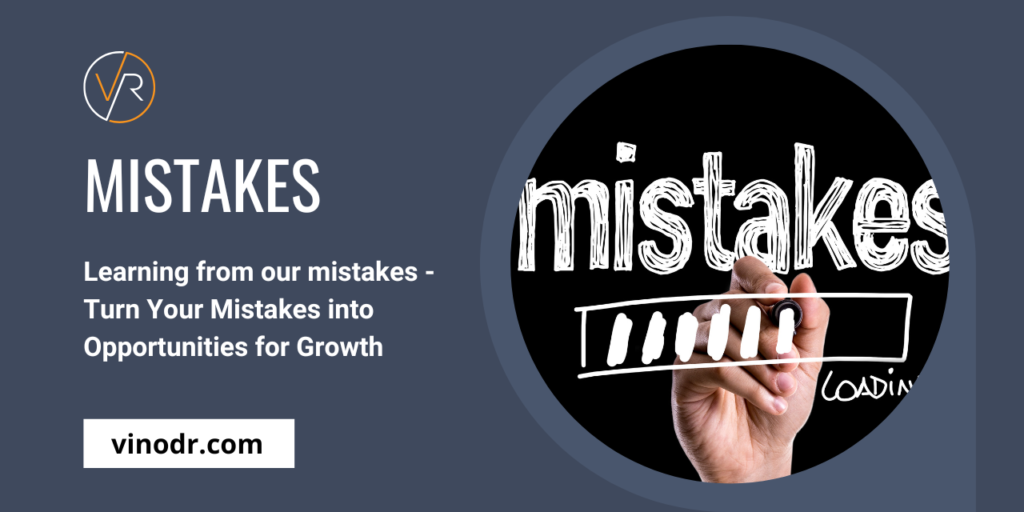Learning from our Mistakes
Turn Your Mistakes into Opportunities for Growth
Mistakes are actions or decisions that lead to undesirable or unexpected outcomes. We all make mistakes at some point in our lives, and while they can be frustrating or even embarrassing, they can also be seen as an opportunity to learn and grow.
Some common reasons for us making mistakes include lack of experience, lack of information or knowledge, miscommunication, and lack of attention or focus. Mistakes can also be caused by more complex factors such as personal biases or values and cultural differences.
Why do we make Mistakes?
Lack of experience: When we’re new to something, we’re more likely to make mistakes because we haven’t had the opportunity to develop the skills and knowledge necessary to do it well.
Lack of information or knowledge: If we don’t have all the facts or understand the context of a situation, we may make decisions or take actions that are based on incorrect assumptions or incomplete information.
Miscommunication: When we don’t communicate clearly or misunderstand what others are saying, we may make mistakes that could have been avoided with better communication.
Lack of attention or focus: If we’re distracted, tired, or not fully engaged, we may overlook important details or make errors in judgment.
Personal biases or values: Sometimes our own biases or values can influence our decisions and cause us to make mistakes.
Cultural differences: Cultural differences can sometimes lead to misunderstandings and mistakes, particularly in situations where there is a language barrier or different expectations around communication and behavior.
Systemic issues: In some cases, mistakes can be the result of systemic issues such as a lack of resources, poor training, or inadequate policies and procedures.
You should know that mistakes are a normal part of learning and growth. Rather than being overly critical of ourselves when we make mistakes, we can use them as opportunities to reflect, learn, and improve.
Does making a mistake make me look bad in front of others?
Making a mistake in front of others can feel embarrassing or even humiliating, depending on the situation. It’s important to know that everyone makes mistakes at some point, and it’s often how we respond to those mistakes that makes the biggest difference.
If you make a mistake in front of others, it’s important to take responsibility for your actions and acknowledge any harm or negative consequences that may have resulted. This shows that you’re taking the situation seriously and are committed to making things right.
It may also be helpful to apologize to anyone who was affected by your mistake. This can help us to repair any damaged relationships and demonstrate your commitment to integrity and accountability.
We should also remember that making mistakes can make you look more human and relatable to others. When we’re honest about our mistakes and work to learn from them, it can inspire others to do the same and create a culture of continuous learning and improvement.
While making a mistake in front of others may feel uncomfortable, it doesn’t have to define you or your reputation. By taking responsibility, apologizing if necessary, and learning from the experience, you can show others that you’re committed to personal and professional growth.
It’s easier to point out others’ mistakes than our own!
When we are with our friends, or with our lover, or at a social gathering, we do find mistakes in what others do quite easily. Some people are quite amused about it. Ever wondered why is that so easy?
Confirmation bias: Our brains tend to filter information in a way that confirms our existing beliefs and biases. This can make it harder for us to see our own mistakes, but easier to spot mistakes in others because we’re not as emotionally invested in their work.
Familiarity: When we’re working on a project, we can become so familiar with it that we start to overlook mistakes. When we’re looking at someone else’s work, we’re not as familiar with it, so we’re more likely to notice errors.
Perspective: When we’re working on something, we’re often focused on the details and may miss the big picture. When we’re looking at someone else’s work, we can see it from a different perspective and may be able to spot mistakes more easily.
Bias towards our own work: We tend to have a bias towards our own work, which can make it harder for us to see mistakes. We may also be more protective of our own work and less willing to acknowledge mistakes.
To overcome these biases and improve our ability to spot our own mistakes, it’s important to cultivate self-awareness and be willing to seek out feedback and constructive criticism. This can help us identify blind spots and areas where we need to improve. It’s also helpful to take breaks and come back to a project with fresh eyes or to work with a team and collaborate on projects to get different perspectives. By being open to learning and feedback, we can improve our ability to spot our own mistakes and become more effective in our work.
I’m not learning from my own mistakes!
If you’re not learning from your mistakes and staying adamant about decisions, it’s important to take a step back and reflect on why this might be happening.
Fear of failure: If you’re afraid of failing, you may be resistant to learning from your mistakes because it reinforces your fear.
Ego: If you’re attached to being right or having all the answers, you may be resistant to learning from your mistakes because it challenges your ego.
Lack of self-awareness: If you’re not aware of your own biases or limitations, you may be resistant to learning from your mistakes because you don’t see the need to change.
Limited perspective: If you have a limited perspective or aren’t open to new ideas, you may be resistant to learning from your mistakes because you don’t see the value in different approaches.
If you’re struggling to learn from your mistakes, it’s important to address the underlying reasons for your resistance. This may involve working with a mentor or coach to identify your blind spots, practicing mindfulness or self-reflection to develop greater self-awareness, or seeking out new experiences and perspectives to challenge your assumptions.
It’s also important to be willing to take risks and try new things, even if they don’t always work out. This can help you build resilience and develop a growth mindset that’s focused on learning and improvement rather than avoiding mistakes.
Learning from the mistake of others is easier!
As Eleanor Roosevelt famously said-
Learn from the mistakes of others. You can’t live long enough to make them all yourself.” – Eleanor Roosevelt.
Read, View, listen: There are many books, videos, podcasts, audio, movies, and articles available that document the failures of others and provide insights on what can be learned from them. These can be valuable resources for gaining knowledge and understanding of how to avoid common pitfalls.
Seek out case studies: Look for case studies or stories of others who have faced similar challenges and learn from their experiences. This can help you understand what went wrong and how you can avoid making the same mistakes.
Attend industry events: Attend industry events, conferences, or seminars to learn from experts and gain insights from peers. Networking with others in your field can help you gain different perspectives and learn from their experiences.
Ask for feedback: Seek feedback from others who have more experience or knowledge in your field. Ask them about their own mistakes and what they learned from them.
Practice empathy: Put yourself in the shoes of others who have made mistakes and try to understand their thought process and reasoning. This can help you gain a deeper understanding of what led to their mistakes and how you can avoid making similar errors.
Avoiding Future Mistakes
However smart we think we are, understand that we can’t avoid all the mistakes in the future. What I’m trying here is to see how much can we minimize our future mistakes.
Learn from your mistakes: Take the time to reflect on what went wrong and identify what you could have done differently. This can help you avoid making similar mistakes in the future.
Seek feedback: Ask others for feedback on your work and be open to constructive criticism. This can help you identify areas where you need to improve and make adjustments.
Be organized: Keep your work area and schedule organized so you can stay on top of tasks and deadlines. This can help prevent mistakes that arise from disorganization and lack of focus.
Double-check your work: Before submitting or presenting your work, take the time to review it carefully for errors or omissions. This can help catch mistakes before they become bigger problems.
Ask questions: If you’re unsure about something, don’t hesitate to ask for clarification. This can help prevent mistakes that result from misunderstanding or miscommunication.
Practice good time management: Give yourself plenty of time to complete tasks and avoid rushing. This can help prevent mistakes that result from carelessness or haste.
Stay up-to-date: Keep yourself informed and up-to-date on best practices, industry trends, and new technologies. This can help you stay ahead of the curve and avoid mistakes that result from outdated knowledge or skills.
When we make mistakes, it’s important to take responsibility for our actions and acknowledge any harm or negative consequences that may have resulted. It’s also important to learn from our mistakes and take steps to avoid repeating them in the future.
One way to minimize the impact of mistakes is to have a growth mindset. This means approaching challenges and failures as opportunities for learning and improvement rather than as evidence of personal flaws or limitations. By adopting a growth mindset, we can build resilience, increase our capacity for learning, and develop a greater sense of self-awareness and empathy.



